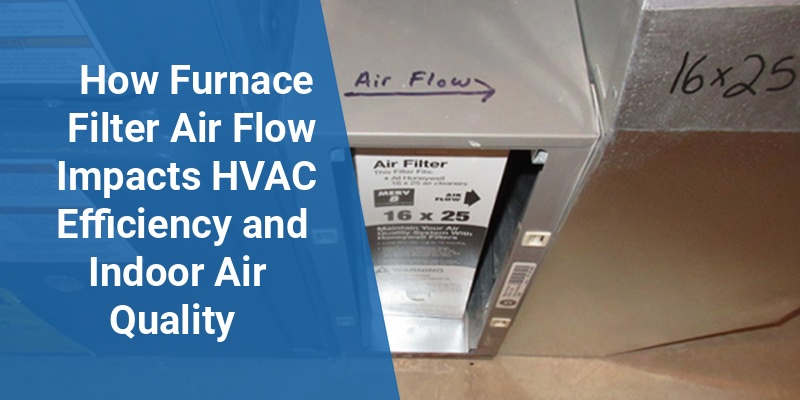Furnace filter air flow is a critical factor in maintaining the efficiency of your HVAC system and ensuring healthy indoor air quality. The way air passes through a furnace filter can significantly influence heating performance, energy consumption, and the lifespan of your equipment. Proper air flow management protects your home environment while optimizing system operation.
| Aspect | Impact |
|---|---|
| Air Flow Resistance | High resistance reduces heating efficiency and increases energy costs |
| Filter Type and MERV Rating | Higher MERV ratings improve filtration but may restrict air flow more |
| Filter Maintenance | Dirty filters block air flow, leading to system strain and poor air quality |
| Proper Sizing | Correct filter sizing ensures optimal air flow and system balance |
What Is Furnace Filter Air Flow?
Furnace filter air flow refers to the movement of air through the HVAC filter during heating or cooling cycles. The filter traps dust, allergens, and debris, allowing clean air to circulate throughout the home. Efficient air flow means that the furnace receives the right amount of air needed for combustion and distribution, supporting both system performance and indoor comfort.
How Air Flow Affects HVAC System Performance
Proper air flow is essential for maintaining HVAC efficiency. When air passes freely through a clean filter, the furnace operates optimally, requiring less energy to heat or cool your home. Restricted air flow—caused by clogged filters or improperly sized ones—increases system workload, boosts utility bills, and may cause premature wear on components such as the blower motor or heat exchanger.
Insufficient air flow can also lead to uneven temperature distribution, causing certain areas of your home to be warmer or cooler than others, impacting comfort and system balance.
Understanding Filter Resistance and Its Role in Air Flow
Filter resistance, or pressure drop, measures how much the filter slows down air moving through it. Higher filter resistance reduces air flow and puts stress on your furnace. Filters with high Minimum Efficiency Reporting Values (MERV) capture smaller particles but often increase resistance.
Homeowners must balance filtration efficiency with acceptable air flow levels. Consulting manufacturer guidelines or HVAC professionals can help select filters that maintain effective air pass-through without compromising filtration.
The Importance of Filter Maintenance for Consistent Air Flow
Over time, furnace filters accumulate dust and debris, which blocks air flow. Regular filter replacement or cleaning is vital to preserving air flow and HVAC health. A clogged filter forces the furnace blower to work harder, increasing wear and energy use. Additionally, poor air flow can lead to overheating, system shutdowns, or costly repairs.
Call 888-906-9139 for Free Local HVAC Quotes – No Obligation, Just Savings!
Most HVAC technicians recommend checking filters monthly and replacing them every 1-3 months depending on usage, household dust levels, pets, and filter type.
Choosing the Right Furnace Filter to Optimize Air Flow
Selecting a filter that matches your furnace’s air flow requirements involves several factors:
- Filter Size: Filters must fit correctly to prevent air bypass and maintain seal integrity.
- MERV Rating: A rating between 6 to 8 is typically sufficient for residential use without heavily restricting air flow.
- Filter Material and Thickness: Pleated filters generally offer better filtration and air flow balance than flat filters.
Using a filter not recommended by the furnace manufacturer may void warranties or impair performance.
Signs of Poor Furnace Air Flow and What to Do
Noticing these symptoms may indicate compromised furnace filter air flow:
- Uneven or weak airflow from vents
- Increased utility bills without weather changes
- Frequent furnace cycling or overheating
- Unusual noises from the blower system
Addressing these issues promptly by inspecting or changing the furnace filter can restore air flow and system efficiency.
Advanced Solutions to Improve Furnace Air Flow
Beyond regular filter care, several strategies enhance air flow through your furnace system, including:
- Upgrading to High-Quality Filters: Selecting filters engineered for low resistance and effective particle capture.
- Installing Electronic Air Cleaners or UV Lights: These reduce airborne contaminants without restricting air flow.
- System Ductwork Inspection: Leaks, blockages, or poor design can hamper overall air flow efficiency.
- Blower Motor Maintenance or Replacement: Ensuring the motor operates at proper speeds to push air effectively.
How Furnace Air Flow Relates to Indoor Air Quality
Effective furnace filter air flow directly impacts your home’s air quality. When air passes smoothly through a well-maintained filter, more pollutants are captured, reducing allergens and irritants indoors. Conversely, blocked air flow allows dust, mold spores, and other contaminants to circulate freely, aggravating respiratory issues and diminishing comfort.
Call 888-906-9139 for Free Local HVAC Quotes – No Obligation, Just Savings!
A balanced approach to filtration and air flow ensures your HVAC system not only heats but contributes to healthier living environments.
Summary of Best Practices for Maintaining Optimal Furnace Filter Air Flow
| Practice | Benefit |
|---|---|
| Regular Filter Replacement | Prevents clogging, maintains consistent air flow |
| Choosing Compatible Filters | Ensures optimal balance of filtration and air resistance |
| Professional HVAC Inspections | Identifies air flow issues beyond filters like duct leaks |
| System Upgrades When Needed | Enhances overall air flow and efficiency |
